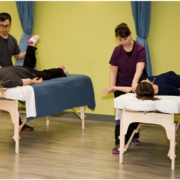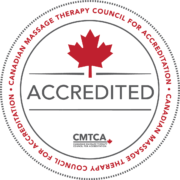How To Find the Perfect Massage Job, part 2: Interviews and Contracts
Welcome to the second half of our job search guide for massage therapists. In Part 1 of this guide, we covered how to determine what that perfect position will look like for you, and how to start finding opportunities that fit those goals. Today, we’ll discuss how to prepare for and ace your interviews, and how to handle contract negotiations.
Step 1: Be Prepared
I have sat on both sides of the job interview table in my career, and the most valuable lesson I’ve learned from this experience is that preparation is essential. As an applicant, I’ve been most successful when I’ve taken the time to research the position and the company, anticipate their questions, and come up with a few of my own. Similarly, there’s hardly anything that impresses me less as an interviewer than someone who obviously didn’t bother to prepare properly: either they have to fumble for answers to my questions, know nothing about the business or industry, or have no questions of their own. And you’d be surprised how often it happens!
Set yourself apart from the other applicants not just by your excellent training, but by doing your homework before the interview. If you’ve taken all the recommended steps from Part 1 of this guide, you’re more than halfway there.
Consider the interview as a conversation, not an interrogation. It’s an opportunity for both of you to learn about each other. They will want to know about your training, goals, strengths, and weaknesses. Try to anticipate their questions, and practice your responses. Why should they hire you?
Get ready to interview them, as well. What do you need to know in order to feel confident taking this position? Prepare a list of questions or topics to cover during (or before) the interview. Here’s a few to get you started:
- What type of massage will you generally be providing? Do most of their clients book relaxation massages, or therapeutic ones? Does the clinic specialize in certain conditions or techniques?
- What do they charge for a massage?
- Will you be an employee, or a contractor? If on contract, will it be a commission split, or a flat monthly room rental?
- If you’re an employee, what benefits (if any) do they offer?
- What is the split amount? Is there a scale or cap?
- What services will the employer provide? For example, if the commission split is 60/40, you need to know what they’re doing to earn their 40%. Ask about marketing, reception, supplies (ie, linens, oils, laundry), etc.
- Will you be expected to sell products?
- Is there a minimum time between treatments? Some clinics only allow 15 minutes between treatments.
- Is there a minimum or maximum number of bookings per week? How much control will you have over your own hours?
- Does the clinic have a policy manual?
- How long have they been in business?
- How long in advance do clients currently have to book their appointments? This is an easy way to gauge how busy you’ll be when you join them.
- Are there clinic-specific processes and paperwork you’ll expected to follow? What forms do they use for health histories and assessment and treatment planning?
- Is there a dress code?
- Is the clinic owner present in the clinic on a regular basis? If not, is the clinic managed day to day by a manager or receptionist?
- What continuing education support do they offer, if any?
Since you’ve already reviewed your priorities and goals, it should be easy to determine what answers you need to hear to these questions in order to be comfortable taking the job. Don’t be afraid to print off a list of questions to bring with you to the interview.
Step 2: The Interview

Finally, it’s time to put all that preparation to the test! My first piece of advice is to be confident. Not just because confidence and a professional manner are two of the “intangibles” that employers look for, but because you deserve to be. You have worked very hard and have been trained to the national standard. You have a lot to be proud of, and the interview is the time to show that off.
Your interview is likely to have two parts: a conversation with the employer, and a massage. When setting up the interview, confirm whether they’d prefer both during the same appointment, or if they’d like you to come back later for the massage (or vice versa). Wear your scrubs to perform the massage.
The interviewer may ask you to perform specific techniques, but most likely you’ll just be asked to perform a relaxation massage. Make sure you’re clear on their expectations regarding the style and length of the massage at the outset. Regardless of the style of massage, make sure you do a thorough health history and assessment. As you work, describe what you’re doing and why. Try to impress them with your flow, rhythm, and tissue engagement skills. This is also a great opportunity to discuss all the other techniques and modalities you’ve been taught, from hydrotherapy and remedial exercise, to seated and sports massage. Make sure they know how well you understand the concepts of assessment and treatment planning, and the conditions you’re able to treat.
Step 3: Don’t Settle
Remember, just because you’re offered a job doesn’t mean you have to take it. There are lots of jobs out there, so you don’t have to accept anything that doesn’t meet your standards. We recommend that you apply at a few places, and choose your favourite.
Don’t be afraid to walk away if something doesn’t feel right. What constitutes a red flag, or even a deal breaker, will vary from person to person. But here are a few specific things to watch out for during the interview and contract negotiation process:
- Is the clinic clean? Does it seem organized and professional?
- Do they have a comprehensive record-keeping system for health histories, SOAP notes, etc?
- Is the employer vague about what your duties or responsibilities will be?
- Do they seem more interested in hiring a salesperson than an RMT?
- Do you feel comfortable with the number of shifts you’ll be expected to work?
If you’re still happy, it’s time to get down to the small print…
Step 4: No Loose Ends
A clearly written contract (or rental agreement) is essential. No matter how much you like and trust your employer or landlord, it’s imperative that you have the details of your business relationship in writing, in advance. Circumstances and relationships change, and memories can be fuzzy. Having a detailed written contract will protect both of you, and provide an easy reference to resolve misunderstandings and disputes.
Ideally, your contract won’t hold any surprises. Since you were so prepared for your interview, and asked so many great questions, it should simply reiterate what you’ve already talked about. Read it thoroughly before signing it, to make sure that you still agree with everything in there. It may be a good idea to have a friend or fellow RMT take a look before you sign. Don’t be afraid to ask the employer about anything you find unclear; request that they rewrite any confusing sections before you sign.
In addition to the topics included in the questions above, make sure that your contract is clear on your start date, what happens when you leave the clinic (what notice is required from both sides? Who will own client files? Is there a non-compete clause?), holidays and sick days (if you’re an employee), and what the grievance and disciplinary procedures are should either of you have a problem.
Congratulations on your first RMT job! We are incredibly proud of you and all that you’ve accomplished over the past two years, and are excited to watch the next step in your journey.
Your first RMT position is really important; it’s your first “real world” experience as a massage therapist, and will help set the tone for the rest of your career. Finding a job that excites and inspires you, in an environment that offers both challenges and support, is essential. We hope that having done all this research and preparation will ensure that your first job will fit the bill. But it might not, and that’s ok. It’s alright to leave! Even a bad experience can be worthwhile, as long as you learn from it.
We wish you the best.









